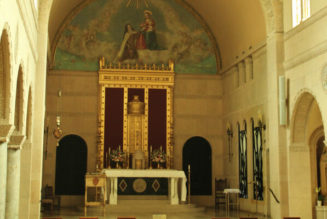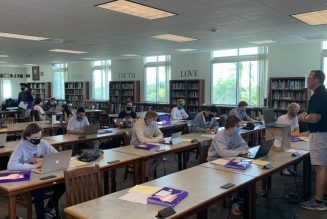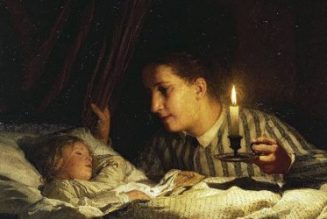Happy Friday friends,
And a very happy feast of the Presentation of the Lord to you all.
I’m not one to engage in uninformed speculation about the hidden life of Christ in the Holy Family, but I do love this feast, and the image of Mary and Joseph presenting their miraculous and divine child in the Temple.
I have to assume that, being mere mortals, even saintly ones, they had no real or clear conception of what, if anything, they were meant to do to prepare Christ for manhood and his mission. But absent any instructions to the contrary, they relied on the simple, humble practice of their faith — including its rituals and traditions — in the expectation that God would meet them there. As He surely did.
For myself, as an admittedly clueless middle-aged father, it’s a comforting encouragement for me. I want to transmit faith to my daughter, and I wish I could do it with a kind of medical efficiency, if only there was a faith booster, or a heresy vaccine.
But having none of these, and being all too aware of my own spiritual poverty, it consoles me to think that when I take her to Mass every week, and present her over and again to the Church to receive the sacraments, I am saying to the Lord that truly she is His child first and entrusting her to Him, just as Mary and Joseph did with their son.
Today is also marked as Candlemas, the traditional and final end to the Christmas season, not to be confused with Candlemass, the Swedish “epic doom metal” band. Honestly, you really don’t want to confuse those two.
Anyway, today is the day after which your neighbors, like me, start muttering judgmentally under their breath about you not having taken down your lights.
So you’re all on notice.
Here’s the news.
The News
There is a lot that is unique — maybe even unusual — about Bishop Raimo Goyarrola, but there’s not much normal about his Diocese of Helsinki, or the Church in Finland either.
This week, our correspondent Edgar Beltrán spent some time with the bishop, a Spaniard and priest of Opus Dei, getting to know Isä Raimo as he’s known locally, and how he’s settling into life as leader of the diocese since his appointment last year.
It’s a fascinating profile of a fascinating match of person and place in the Church. Finland’s native Catholic population may be small, but the arrival of waves of refugees over the years means the local Church could actually be nearly twice its officially estimated size.
Issues of evangelization, social integration, and the mechanics of dealing with a flock divided between one big population center in Helsinki and otherwise spread across an area the size of Italy make for a complicated picture.
But the new bishop is full of ideas and plans, including for a new Catholic school, taking over management of a semi-private retirement home, and construction of a new “youth camp.”
“As you see, I’m throwing lines into the sea and some of them will catch fish,” Goyarrola told Edgar.
The bishop has become something of an object of popular fascination in Finland. He says he’s fielded nearly 50 interview requests from local media curious about the “young and dynamic” new guy.
But what is the bigger picture the bishop sees for his diocese? And what lessons are there for the rest of the Church?
—
Amid escalating violence against Catholics in northern Nigeria, one seminary is boosting its security measures and could become a model for seminaries and religious houses across the region.
Christ the King Major Seminary in the Diocese of Kafanchan is working with local contractors to install a solar-powered security system, funded largely through a grant from Aid to the Church in Need.
It is, needless to say, an absolute catastrophe that such measures are needed at all, and the fact that other religious houses in the region are in need of a template to follow just to keep their residents safe from terror attacks and kidnappings speaks volumes about what Catholics are living through in Nigeria.
—
Germany’s Archdiocese of Cologne is, by the numbers, the country’s largest see. Yet despite the Church in Germany’s legendary (state-collected) wealth, Cologne is projecting a budget deficit of almost 21 million euros in 2024.
For years, diocesan revenues have risen even as membership plunged, a byproduct of baptized Catholics being taxed for the Church even if they cease any actual practice of the faith, an anomaly sarcastically dubbed the Kirchensteuerwunder, or “church tax miracle.”
Now, it seems, demographics are finally becoming destiny for German dioceses.
So what are the numbers in Cologne, and what does this mean for the rest of Germany?
—
This week is Catholic schools week, an important showcase for institutions facing many of the same financial and demographic pressures as parishes across the U.S.
In true Pillar style, we wanted to look a little past the usual headlines, though — crunching the numbers to bring you something different. That’s why we have a stat guru of the quality of Brendan Hodge.
Brendan looked at what the available data can tell us about how important Catholic schools are to fostering vocations to the diocesan priesthood and — and this is where it gets really interesting — what we can tell about the number of vocations coming from the increasing number of Catholic homeschooling families.
This is some must-see TV. Don’t miss it.
This week’s Pillar Post is brought to you by the Southwest Indian Foundation’s “Catholic Pueblo Revival Paid Internship Program,” now accepting applications from college-aged men for its summer 2024 paid internship in Gallup, New Mexico.
As a missionary intern, you will help build the Saint Kateri Rosary Walk by hand, learning how to use traditional southwestern building materials and techniques. The program includes spiritual and academic formation, as well as travel opportunities while experiencing the life and history of the Catholic Southwest. Learn more at saintkaterirosarywalk.org
The Dicastery for the Doctrine of the Faith this week issued a “clarification” on its remit, and a reminder that it is only competent to handle very narrowly defined cases of abuse involving the legal category of “vulnerable adults.”
It caught a few people on the hop, and more than a few assumed this must be a big change in how abuse cases were going to be handled from now on.
I can understand their confusion, I guess. It’s not unusual these days for Vatican departments to completely change a law or how it’s applied and try to palm it off as a “clarification.” In this case, though, it would have maybe been better called an “impatient reminder” of something the department has been saying for years.
The answer, I think, is probably “everyone” because of, you know, all of the bad things going on, all of the time.
As I noted in the analysis, given the confusing nature — and scandalously bad handling — of notoriously public cases like that of (still) Fr. Marko Rupnik (no longer) SJ, it is maybe not surprising that the public perception has arisen that any and every major scandal involving clerical sexual abuse is the DDF’s mess to clean up.
This isn’t true, of course. The DDF’s caseload on abuse is limited strictly to those instances involving minors, those equivalent in law to minors, and the sacraments.
As we have unfortunately seen, repeatedly, that outside of those circumstances a lot can and does still go disastrously wrong.
And given the desire not to be caught holding a red-hot scandal, I can understand why there has developed a kind of default instinct among religious orders, dioceses, and other Church authorities to just send everything to the DDF and let them figure it out.
That’s just not workable, sustainable, or legal, though.
There is, for sure, a genuine debate to be had about the expanded category of “vulnerable adults” created by Pope Francis in Vos estis lux mundi (VELM) and how workable it is as law.
No less a figure than Fr. Hans Zollner S.J., nobody’s idea of a squish on matters of abuse prevention and prosecution, has questioned the whole concept of “vulnerable adult” in VELM and pointed out that it has created a category that can really be applied to almost anyone — and in so doing made it difficult if not impossible to apply VELM with any real consistency or efficiency into difficulty.
Nevertheless, as Archbishop Scicluna reminded the USCCB in a lecture in 2021, local bishops are on the hook for policing and prosecuting “vulnerable adult” cases under the norms of Vos estis, and could themselves be prosecuted for failing to do so.
My general read of the DDF’s clarification this week is that they are running out of patience with everyone asking them to do their homework for them, and carrying the can for their messes.
You can read the whole analysis here.
Doing it the hard way, again
The general secretary of the Belgian bishops’ conference warned this week that Pope Francis might find public opinion against him when he makes his scheduled visit to the country later this year.
For those who do not recall, Vangheluwe resigned as Bishop of Bruges in 2010 after admitting to sexually abusing his nephew.
He later admitted to abusing a second nephew as well, though he insisted he did not think this made him a pedophile and, in one memorable TV appearance after leaving office, the bishop seemed to suggest that it was all a game between them, really.
He really, actually, did all that.
The bishop now lives in France in Church-ordered exile. Nevertheless, Vangheluwe has not been laicized, though the ensuing scandal of his crimes did also tarnish the reputation of Cardinal Godfried Danneels, the then Archbishop of Mechelen-Brussels, after an audio recording was leaked in which the cardinal pressured one of the nephews not to publicly accuse his uncle.
That Vangheluwe remains a bishop, in whatever restricted living conditions, is an ongoing source of scandal in his home country. And as Spriet told the Belgian parliament this week, the bishops there are not happy about it. They have, he said, repeatedly written to Rome to “reiterate their demand for Roger Vangheluwe’s removal from ordained ministry.”
“We know that those responsible in Rome are aware of the magnitude of the scandal and are working for a solution. It will be difficult for Pope Francis to make a peaceful visit to our country in September until there is clarity on this matter,” Spriet said, perhaps stating the obvious.
Especially considering “that during that visit the necessary time and space be provided for a personal meeting between Pope Francis and victims who wish to speak to him.”
At the time the Vangheluwe scandal broke, the then pope, Benedict XVI, was juggling the fallout of emerging international abuse scandals, including in Ireland and the case of Marcel Maciel, the founder of the Legionaries of Christ.
That same year, 2010, Benedict issued new, enhanced norms for dealing with cases of clerical sexual abuse of minors, but there was no obvious answer — and to my mind no possible good answer — as to why he was neither stripped of his episcopal rank nor dismissed from the clerical state.
Now, it’s not clear, from a Vatican policy perspective, exactly how many of his own nephews a bishop has to admit to abusing before he merits laicization. Though, on the experience of the last few years, I would imagine the answer is that it depends on who they are and who they know.
At the time of Vangheluwe’s disgrace (and after) he certainly seemed to benefit from the support of several prominent figures, including Cardinal Danneels.
Another person moved to sympathy for the bishop was one Austen Ivereigh, then an emerging voice in international Catholic media, who wrote at the time that it was “easy to condemn the two Belgian bishops [Vangheluwe and Daneels]” but that Vangheluwe was “obviously a penitent man” — an observation I would submit didn’t age well.
Ivereigh argued that maybe Danneels “wasn’t simply trying to silence the victim in order to protect the Church, nor in his own interests, but was acting as his conscience told him to.” He concluded that the whole scandal left him “more compassionate than indignant” with Vangheluwe and Daneels.
Both Ivereigh and Danneels went on to enjoy places of prominence and influence during the reign of Pope Francis, and perhaps they deserve some credit for fixing Francis’ thinking on the Vangheluwe case, despite the Belgian bishops’ repeated appeals that he be laicized.
Danneels, whose resignation was accepted in the fallout of the 2010 scandals in Belgium, was later rehabilitated by Francis and included as a papally invited delegate to the 2015 synod on the family, of all things, before dying in 2019.
Ivereigh has gone on to become Francis’ official biographer and quasi-unofficial spin doctor and social media interpreter, and has more recently weighed in as an enthusiastic fan of Fr. Marko Rupnik’s work, which he’s defended as “works of grace” despite the priest sexually abusing religious sisters as part of his creative process.
Whatever the reasons, the Belgian bishops’ repeated requests for a final resolution of the Vangheluwe situation have now gone unheeded by two popes for more than a decade. But, with the scandal now hanging dangerously over a papal visit to the country, it seems at the least highly possible that some action will be taken, at last.
If Pope Francis does choose to act against Vangheluwe, it will be a load off the collective Belgian Catholic conscience, but it will also raise questions about the legal credibility of imposing such a penalty after so long a delay.
To many, it will appear like yet another instance of the Vatican responding ad hoc to a public outcry over scandal, after ignoring for years the legitimate demands of justice. In short, doing it the hard way.
It’s a growing and unenviable legacy for Pope Francis, one which could see Vangheluwe added to an ever-growing list of others who appear to have first benefitted from institutional clemency, if not outright protection at times, thanks to their closeness to the papal court: Zanchetta, Rupnik, Ricard, and so on.
To be sure, much of it has its roots in previous pontificates. There’s been a long and damaging Roman preference for offering a preferential option for the prominent offenders. And also a clear reticence to impose penalties, instead of giving offenders like Vangheluwe a kind of ecclesiastical “gentleman’s way out” by letting them resign.
But it stands in increasingly stark contrast to decisive, even punitive papal action taken by Francis against others, like Bishop Daniel Fernández Torres of Arecibo, who was summarily dismissed from office without any particular cause or reason given, other than that he seemed to be unpopular among those with the papal ear.
For all Francis’ extensive record as a legislator — and he has promulgated more penal law than any modern pope I can think of — at the highest level, the rule of that law is now applied so asymmetrically, so without obvious or consistent purpose or process or outcome, that it is hard at times to describe it as anything other than capricious.
A very common crime
Finally, in a story that is a week old, but just coming across my radar, spare a thought this weekend for the Spanish man known in court documents only as OAP, who has been sentenced to two years in prison and fined some 12,000 for crimes against historical heritage in Valencia.
Why would he do such a thing?
Well, it turns out he was attempting to destroy evidence of the somewhat modest social circumstances of the births of several of his ancestors.
Apparently, OAP, who is (I’m going to guess not for very much longer) a knight of the Sovereign Military Order of Malta, was looking to ascend up the orders classes of knighthood but needed to prove, as one does, noble descent going back a set number of generations to qualify for the rank of Knight of Honor and Devotion in Obedience.
OAP, apparently, had some disqualifyingly common progenitors whom he tried to obscure in his paperwork. He did a bad enough job that the Order’s Grand Magistry in Rome was suspicious and dispatched someone to Spain to check the records, prompting OAP to go on his archival tear.
The order’s investigator was obviously surprised to find all the documents that were missing from OAP’s application also missing from local archives — with pages visibly ripped from record books. Members of the local constabulary were duly called to investigate.
OAP further complicated matters for himself at this point when he started anonymously mailing the stolen pages back to the archives, demonstrating exactly the kind of panicked thinking under pressure you don’t get from the noble class.
Anyway, he was arrested and charged and convicted, and there it is.
The part I find bizarre and pitiful is this: sure, the Order of Malta have different orders of knighthood within their ranks. And it’s true that certain leadership positions used to be reserved to those who could prove noble lineage going back several generations.
But all that’s been reformed out of the order’s own legal code (a canonical hobby of mine). I know of Americans on the sovereign council; the current Grand Master is a Canadian, for crying out loud.
So OAP was doing all this — not for the prospect of practical advancement within what is admittedly an incredibly cool sovereign international group — but for a purely notional distinction within an order of which he was already a member.
He did it for a better class of lapel pin to wear at dinner parties, basically. How vulgar can you get?
I can’t think of anything more antithetical to the spirit and reality of service in an order that has worked for centuries to preserve its unique history while remaining focused on the practical — and, in many parts of the world, essential — works of service to the Lord’s poor and sick which are its raison d’être.
There will always be those, I suppose, who aspire to dressing up like an ecclesiastical dandy highwayman and swanning about in cool black robes, and don’t care a straw for the honest works of service orders like the knights are actually all about. Though it seems pitiable to me that such petty vanities would move a person to fraud and crime.
Anyway, hats off (cowls off?) to the knights, though, for catching the guy.
See you next week,
Ed. Condon
Editor
The Pillar
This week’s Pillar Post is brought to you by the Southwest Indian Foundation’s “Catholic Pueblo Revival Paid Internship Program,” now accepting applications from college-aged men for its summer 2024 paid internship in Gallup, New Mexico.
As a missionary intern, you will help build the Saint Kateri Rosary Walk by hand, learning how to use traditional southwestern building materials and techniques. The program includes spiritual and academic formation, as well as travel opportunities while experiencing the life and history of the Catholic Southwest. Learn more at saintkaterirosarywalk.org
Comments 30
Services Marketplace – Listings, Bookings & Reviews














